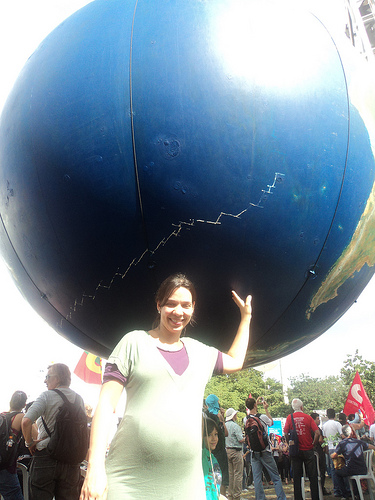Fabiana Frayssinet
RIO DE JANEIRO, Jun 22 (TerraViva) – The downpour that fell Friday in this Brazilian city was nature’s warning to the heads of state meeting at the Rio+20 summit. The generation of Noe (Noah), an environmentalist’s son who will be born a month from now, will have to save biodiversity that is more complex than that of his Biblical namesake.

Maureen Santos is working for a better world for her unborn son Noe (Noah). Credit: Fabiana Frayssinet/IPS
“It was really heavy rainfall, and we were worried,” Maureen Santos told IPS. She is an activist with FASE, one of the Brazilian groups that organised the People’s Summit, held parallel since Jun. 15 to the U.N. Conference on Sustainable Development, or Rio+20.
In Rio de Janeiro, like in other cities around the world, this kind of unusually heavy rainfall is causing environmental tragedies like flooding, destruction of homes, and deaths in at-risk areas like hillsides and lowlands. Scientists say it is one of the effects of climate change.
“We were worried about the people camping here, and about the final assembly, which was held outside. But although that was the reason for the delay of the assembly, we had a shining closing session,” Santos said.
The activist is pregnant. In one month she will give birth to her first son, Noe (which is Noah in Portuguese).
The activist hopes her son will not have to suffer such destructive downpours like the ones that are forecast unless urgent action against climate change is taken, and that a kind of modern-day Noah’s ark will not have to be resorted to in order to salvage millions of endangered species.
“We might not see it, but we want the future to be different for him,” Santos told IPS in an interview given under a giant globe representing planet Earth.
“A world where we share common goods, nature does not have a price, the economy serves the people and is based on local trade, the crazy traffic in cities is reduced, there is less pollution and disease, and people are not as selfish,” she said.
The young expectant mother hopes this will be brought about by global demonstrations like the ones that the People’s Summit decided to promote.
Santos’ hopes for her son echo what was expressed in the People’s Summit’s final assembly for “social and environmental justice,” which brought together peasant, indigenous, black, student and faith-based movements, among others.
The assembly said the heads of state meeting over the last three days at Rio+20 “demonstrated irresponsibility towards the future of the planet and promoted their own government’s interests.”
The activists say the majority of the governments form part of the “new capitalist economy,” dominated by multilateral financial institutions, coalitions at their service like the G8 most powerful countries and the G20 industrialised and emerging economies, and a United Nations “taken over” by corporate interests.
“As the (global economic) crisis is aggravated, more corporations are encroaching on the rights of the people, democracy and nature, kidnapping the shared goods of humanity to save the economic and financial system,” the assembly’s final declaration says.
The assembly decided to hold worldwide demonstrations to combat “the current phase of capitalism, which is the green economy” and the new “financialisation” of the carbon and biodiversity markets.
They also committed to fighting for a solidarity economy, a clean energy mix, organic family agriculture, food sovereignty, decent, healthy work, access to all rights for everyone, better distribution of wealth, and the fight against racism and other forms of intolerance.
“It is clear that our document has more proposals and solutions than the official one,” said Santos.
The assembly ended with a “mystical” ceremony in which a group of women dressed up as “indignant jaguars” chanted slogans like “Mother Earth is outraged/Nothing happened in the official summit.”
Marcelo Durao, with Brazil’s Landless Movement and the international small farmers’ movement Via Campesina, told IPS that the official document was “a mere formality… adopted by corporations, which expresses little concern for the (planet’s) people.”
Darci Frigo with Terra de Direitos (Land of Rights), a Brazilian NGO, said “We confirmed that the official summit was a huge failure because the document approved significantly diluted the proposals and left it clear that it is just a first step for them, which confirms that in the last 20 years since the 1992 Earth Summit (in Rio de Janeiro) little progress was made in the fight against poverty and other causes that are generating environmental and economic crises,” she said.
Frigo was on the committee that delivered the final declaration of the People’s Summit to U.N. Secretary-General Ban Ki-moon.
“
Ban only admitted that there were discrepancies over the concept of the “green economy” and “he was impacted by our position on the green economy as a false mechanism and solution for the problems of humanity,” Frigo told IPS.
The People’s Summit organisers said the debates there were positive, and praised the new method established to make the conclusions of the different thematic groups and seminars converge in plenary assemblies.
But they played down the problems of organisation at an event that mobilised some 14,000 people from across the globe, such as changes of venues for the debates, and difficulties in access to food and lodging for participants and in centralising the information to be made available to the press.







 Add to Google
Add to Google







